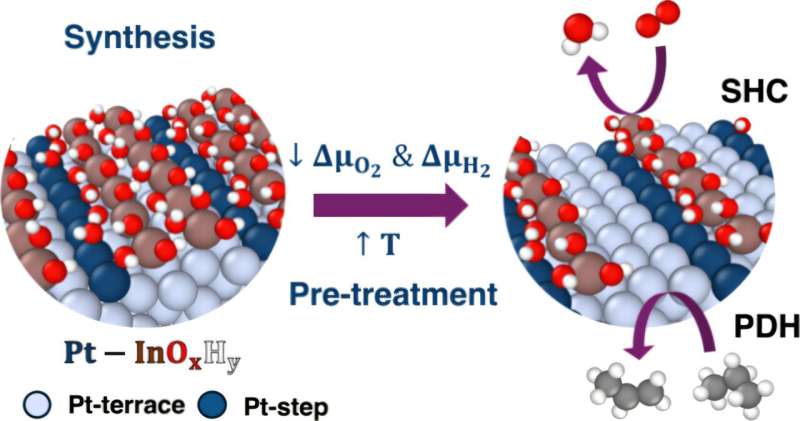Science
Algorithms Illuminate Propane to Propylene Conversion Process

Researchers at the University of Rochester have developed innovative algorithms to uncover the complex atomic processes involved in converting propane into propylene, a key ingredient in numerous everyday products. This breakthrough could revolutionize industrial applications, making production more efficient and cost-effective.
Understanding the Conversion Process
Propylene is fundamental in manufacturing items such as plastic squeeze bottles and outdoor furniture. A study published in 2021 in the journal Science showcased how chemists could utilize tandem nanoscale catalysts to streamline the conversion of propane to propylene by combining multiple steps into a single reaction. While this method showed promise for improving yield and reducing costs, the complexities at the atomic level remained poorly understood, hindering wider application across various industrial processes.
In their recent study published on November 13, 2025, in the Journal of the American Chemical Society, the team led by Assistant Professor Siddharth Deshpande aims to bridge this knowledge gap. Deshpande and his Ph.D. student, Snehitha Srirangam, employed algorithmic approaches to analyze the intricate chemistry involved in the catalytic conversion process.
Key Findings and Implications
Deshpande noted, “There are so many different possibilities of what’s happening at the catalytic active sites, so we need an algorithmic approach to very easily yet logically screen through the large amount of possibilities that exist and focus on the most important ones.” The refined algorithms enabled a detailed examination of both the metallic and oxide phases that govern this complex reaction.
Among their findings, the researchers discovered that the oxide in the chemical reaction tends to cluster around defective metal sites, a factor crucial for the catalyst’s stability. Despite varying chemical compositions, the oxide consistently maintained its role in proximity to these defective sites. This insight could lead to significant advancements in the efficiency of propylene production, as companies could leverage this knowledge to optimize their processes.
Deshpande expressed optimism about the potential applications of their work, stating, “Our approach is very general and can open the doors to understanding many of these processes that have remained an enigma for decades.” He emphasized that while these chemical processes are widely utilized, there is still much to learn about their underlying mechanisms.
The implications of this research extend beyond propylene production. The algorithmic techniques developed could be instrumental in understanding other chemical reactions, such as methanol synthesis, which is critical for producing a variety of products, including paints and fuel cells. By moving away from traditional trial-and-error methods, industries could adopt more strategic and efficient approaches, ultimately benefiting both their operations and the environment.
As the demand for propylene and similar industrial materials continues to grow, the findings from the University of Rochester could play a pivotal role in shaping the future of chemical engineering and production practices.
For further details, refer to the study: Snehitha Srirangam et al., “Site-Selective Oxide Rearrangement in a Tandem Metal–Metal Oxide Catalyst Improves Selectivity in Oxidative Dehydrogenation of Propane,” published in the Journal of the American Chemical Society, DOI: 10.1021/jacs.5c13571.
-

 Science4 weeks ago
Science4 weeks agoInterstellar Object 3I/ATLAS Emits Unique Metal Alloy, Says Scientist
-

 Science4 weeks ago
Science4 weeks agoResearchers Achieve Fastest Genome Sequencing in Under Four Hours
-

 Politics4 weeks ago
Politics4 weeks agoAfghan Refugee Detained by ICE After Asylum Hearing in New York
-

 Business4 weeks ago
Business4 weeks agoIconic Sand Dollar Social Club Listed for $3 Million in Folly Beach
-

 Health4 weeks ago
Health4 weeks agoPeptilogics Secures $78 Million to Combat Prosthetic Joint Infections
-

 Business4 weeks ago
Business4 weeks agoMcEwen Inc. Secures Tartan Lake Gold Mine Through Acquisition
-

 Lifestyle4 weeks ago
Lifestyle4 weeks agoJump for Good: San Clemente Pier Fundraiser Allows Legal Leaps
-

 Science4 weeks ago
Science4 weeks agoMars Observed: Detailed Imaging Reveals Dust Avalanche Dynamics
-

 Health4 weeks ago
Health4 weeks agoResearcher Uncovers Zika Virus Pathway to Placenta Using Nanotubes
-

 World4 weeks ago
World4 weeks agoUS Passport Ranks Drop Out of Top 10 for First Time Ever
-

 Entertainment4 weeks ago
Entertainment4 weeks agoJennifer Lopez Addresses A-Rod Split in Candid Interview
-

 Business4 weeks ago
Business4 weeks agoSan Jose High-Rise Faces Foreclosure Over $182.5 Million Loan









